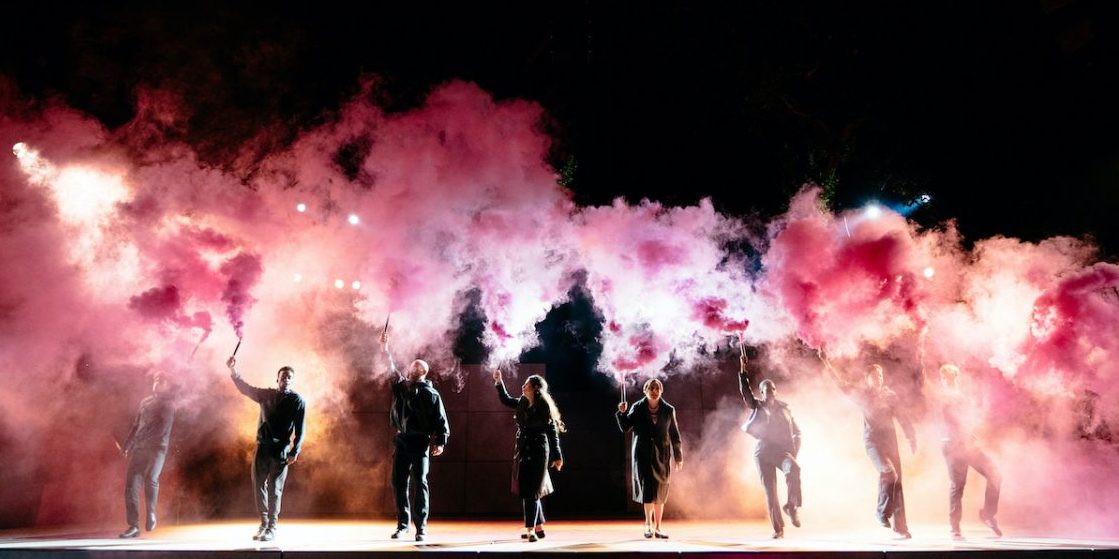The season at Regent’s Park closes with a reworking of Sophocles’ Antigone by Inua Ellams. The framework of key familial relationships in the original is preserved, but the action is transferred from the archaic era in Thebes to the present day.
Creon is a Muslim Home Secretary and later Prime Minister, of a conservative bent, assisted by an adviser reminiscent of Dominic Cummings, who tells him to follow the data which indicates that heated rhetoric and tough action on terrorist suspects and immigration will always win votes. The trouble is that this all cuts too close to home, because his two nephews, Eteocles and Polyneices, the one a policeman, the other an estranged emigrant to Syria, kill one another. The former receives a state funeral, the other remains unburied in a detention centre. This is the situation that formerly apolitical Antigone, assisted by her milder sister Ismene, protests, thus defying the law and putting their own lives at risk, much to the consternation of Eurydice, Creon’s wife, and Haemon, Creon’s stepson and Antigone’s boyfriend. A tragic denouement inevitably follows, with much commentary from a chorus of citizens and friends on issues such as government policy on immigration, and how to reconcile the conflicts of identity around being a British Muslim.
Of course, adaptations and updating of Sophocles are nothing new, and the test is whether the changes add to or detract from the original. One example that gets the judgement right is Jean Anouilh’s version written during and set in Vichy France, where the audience must be relied upon to work out the implications of the relationship between the individual and the state. Less, as so often, is more. Shift the emotional polarities and balance of ideas too far and you beg the question of why you are not simply writing your own new play about the issues that matter to you. That seems to me the trap that Ellams falls into here.
While there are some effective scenes, passages of fluent verse writing, and carefully structured confrontations, the writing changes both too much and too little in the original. Gone is the exquisite even-handedness of the debate between the rights of the individual and the duties owed to the state – the two sides of the coin necessary for any debate over rights. In its place comes strident rhetoric that offers unchallenged endorsement of progressive opinions. This may reflect the audience’s views but lowers the dramatic tension. On the other hand, by preserving the issue of burial rites as the trigger for Antigone’s rebellion, a certain implausibility intrudes in the face of so much modernity elsewhere.
Where the production, at its best, is where it cleaves close to the dramaturgy of the original. The chorus scenes were particularly well done, with excellent choreography (Carrie-Anne Ingrouille) and music (Michael Asante) embodying and intensifying the shifting mood of the crowd in terms that are both very accessible and entirely faithful to the spirit of Athenian drama. And apart from a bizarre opening scene, the stage setting by Leslie Travers was refreshingly uncluttered and minimalist, allowing the action to ebb and flow naturally.
The performances varied in quality, with some actors unskilled in projecting nuance in the broad outdoor space of this unique stage. But in the title role, Zeinab Hasan developed a real authority and righteous anger that commanded respect and Tony Jayawardena found more than mere authoritarian tendencies in Creon. Some of the more subtle contributions came in minor roles – Sandy Grierson’s depiction of the canny special adviser was pitch perfect, as was the geeky intervention of Eli London’s Tiresias, a particularly neat piece of updating. Particular credit should go to deaf actor Nadeem Islam, whose angry, frustrated depiction of marginalised Polyneices lit up the first half, and Oliver Johnstone, whose gradually collapsing faith in the world of PR made Haemon much more of an intriguing character than he usually is.
So overall this ambitious reworking leaves a mixed impression. There are many interesting ideas jostling alongside one another that deserves further exploration and development in an original play. Here the framework of the original play and the newly devised content rub up uneasily against one another defying satisfactory resolution.

